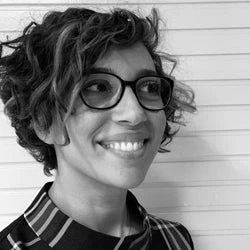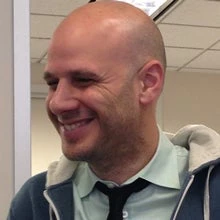Over the past few years, two research departments in the Development Economics Vice Presidency (DECVP), namely the Development Research Group (DRG) and the Development Impact Evaluation unit (DIME) have recruited 24 researchers. Many of these junior researchers joined the World Bank during a period, in which they could not physically come to the office and meet with us, schedule coffee and lunch meetings with our operational colleagues, or attend conferences and give seminars in person to broaden their networks. To somewhat ameliorate this issue, we will be running a three-part series to introduce them to our colleagues in the Bank and the rest of the large development community outside of it. We have grouped them by fields and will introduce eight of them each day between today and Thursday. We hope that these short blurbs will pique the interest of our WB colleagues to reach out to these junior researchers to include them in their important work. Equally, we hope that seminar organizers at academic institutions and other development organizations will invite them for talks – virtual for now and, hopefully, in person soon.
In today’s first post we highlight researchers working on macroeconomics, trade and transportation, and private sector development – but also note that people work on multiple topics and that in many places we would all just be classified as “development economists”.
Macro
Tatjana Kleineberg’s research lies at the intersection of Macroeconomics, Labor Economics, and Regional and Urban Economics. She is interested in operational work in these broad areas with a particular interest in regional development, rural-urban wage gaps, and migration. Her current research studies how policies affect educational achievements, social mobility, and economic opportunities across different locations with a focus on education policies in the US and policies in emerging economies. In addition, she studies the effects of frictions in occupational choices on the aggregate economy and the process of structural transformation. She studies this topic in the context of caste identities in India and gender identities in a cross-section of countries. She holds a PhD in Economics from Yale University and a Bachelor in Political Science from Sciences Po Paris.
Mahvish Shaukat is an economist in the Macroeconomics and Growth Team in the Development Research Group. She is interested in governance, political economy, and public finance. Her research explores these topics with the goal of understanding how institutions and incentives shape state efficacy and citizen welfare. In recent work, Mahvish investigated the influence of electoral competition on politicians, and whether communication designed to shift perceptions of state capacity redress deep-rooted mistrust in state institutions. In ongoing work, she is studying whether strengthening the link between local taxation and urban services can increase citizens’ willingness to pay taxes, improve service delivery, and ultimately revitalize the social compact between citizen and state. She is also part of a research team working with Bank operations to design and evaluate a large-scale training program that aims to build capacity within Indonesia’s village governments.
Matias Moretti is a macroeconomist that specializes in international finance. In his job market paper , he studies the macroeconomic effects of increases in corporate risk during sovereign debt crises. The novelty of the paper is to highlight that increases in sovereign risk lead to large increases in corporate risk that further weaken domestic banks’ balance sheets, reducing credit to firms, and amplifying the size and persistence of sovereign debt crises. In related work, he studies financial innovation in sovereign debt markets. He finds that the liquidity premium of newly introduced bonds significantly reduces the benefits of introducing new types of debt instruments, which helps to explain the lack of financial innovation in sovereign debt markets across developing economies. Matias hopes to provide cross-support in areas related to capital flows to emerging economies, provision of credit to SMEs, and the development of financial institutions. Matias will earn his PhD from New York University in May 2021. He will spend one year as an IES postdoctoral fellow at Princeton University before joining DECRG in July 2022.
Trade and Transportation
Devaki Ghose uses quantitative spatial models and empirical tools to improve our understanding of how economic shocks, including trade shocks, affect spatial inequality and welfare, in the presence of trade and migration costs. At a more granular level, she uses firm-level data to study how firms respond to trade shocks, and how these responses are shaped by firm characteristics and the presence of barriers to trade, such as non-tariff measures (NTMs). She is interested in providing cross-support in the areas of trade, migration, and transportation costs. In her job market paper, she studies how the Information Technology (IT) boom in India affected higher education and work decisions, and how these decisions shaped the regional welfare gains from trade. She shows that the presence of migration and trade costs play a key role in determining the regional gains from trade. In various counterfactual analysis, she uses the structural model to quantify the welfare gains from trade with reduced migration costs. Devaki Ghose earned her PhD in economics from the University of Virginia in 2020 and joined the World Bank DECRG team in 2020.
Roman David Zarate studies how different forms of market integration across and within countries impact welfare, aggregate productivity, and growth in developing countries. Methodologically, his research combines quasi-experimental variation with structural evaluations. In his JMP, He studies the impact of transit infrastructure that facilitates commuting within cities on informality and allocative efficiency. He finds that transit improvements that connect workers with formal jobs lead to higher efficiency gains. In the future, he would like to continue working on economic geography and international trade and provide cross-support in the areas of urban policies, optimal infrastructure, international trade, and land regulations. He received his Ph.D. in Economics from the University of California, Berkeley, in August 2020 and joined DECRG in September 2020.
Alejandro Molnar studies transportation and digital platforms, and their interaction with cities and trade. In a recent paper, he estimates the impact of taxi deregulation on congestion in a major metropolitan area, and quantifies the role of ridehail in congestion as well as the equilibrium effect of alternative congestion pricing policies. In follow-up work he is quantifying the impact of e-commerce on urban freight and road use with measures of traffic density derived from real-time camera feeds. Alejandro's ongoing cross-support includes work to bridge the gap between transportation planning and both causal and equilibrium analysis research in economics. His work involves the use of urban sensor and remote-sensed data at high spatial and time resolutions, as well as data from firms, administrative records and online sources.
Private Sector Development
Erin Kelley is an Economist in the Development Impact Evaluation (DIME) unit at the World Bank. Erin’s research focuses on issues related to labor market frictions, technology adoption in agriculture and social protection. Her work on labor markets frictions includes projects in Kenya that document how monitoring technologies improve firm productivity by helping firm owners restructure contracts, and work with a large e-commerce platform in Africa that investigates how expanding market-access for small firms affects firm growth. Another area of her work focuses on understanding barriers to technology adoption in agriculture, including research in Bangladesh that establishes how the use of demonstration plots can induce communication about new seed varieties. Her work on social protection and refugee populations estimates the impacts of idleness on psychosocial wellbeing and documents preferences for repatriation among the Rohingya refugees in Bangladesh. In a recent paper Erin and her co-authors find that engaging refugees in productive tasks dramatically improves their psycho-social wellbeing. Erin welcomes ongoing partnerships on issues related to labor markets and firm growth, agriculture, and social protection.
Tristan Reed studies questions at the intersection of industrial organization and development. He has blogged about his recent empirical work on impact investing in emerging market economies, and his job market paper examined the normative case for place-based investment subsides in rural areas of India. After his PhD at Harvard, he worked in the private sector and World Bank operations before joining the research group.





Join the Conversation